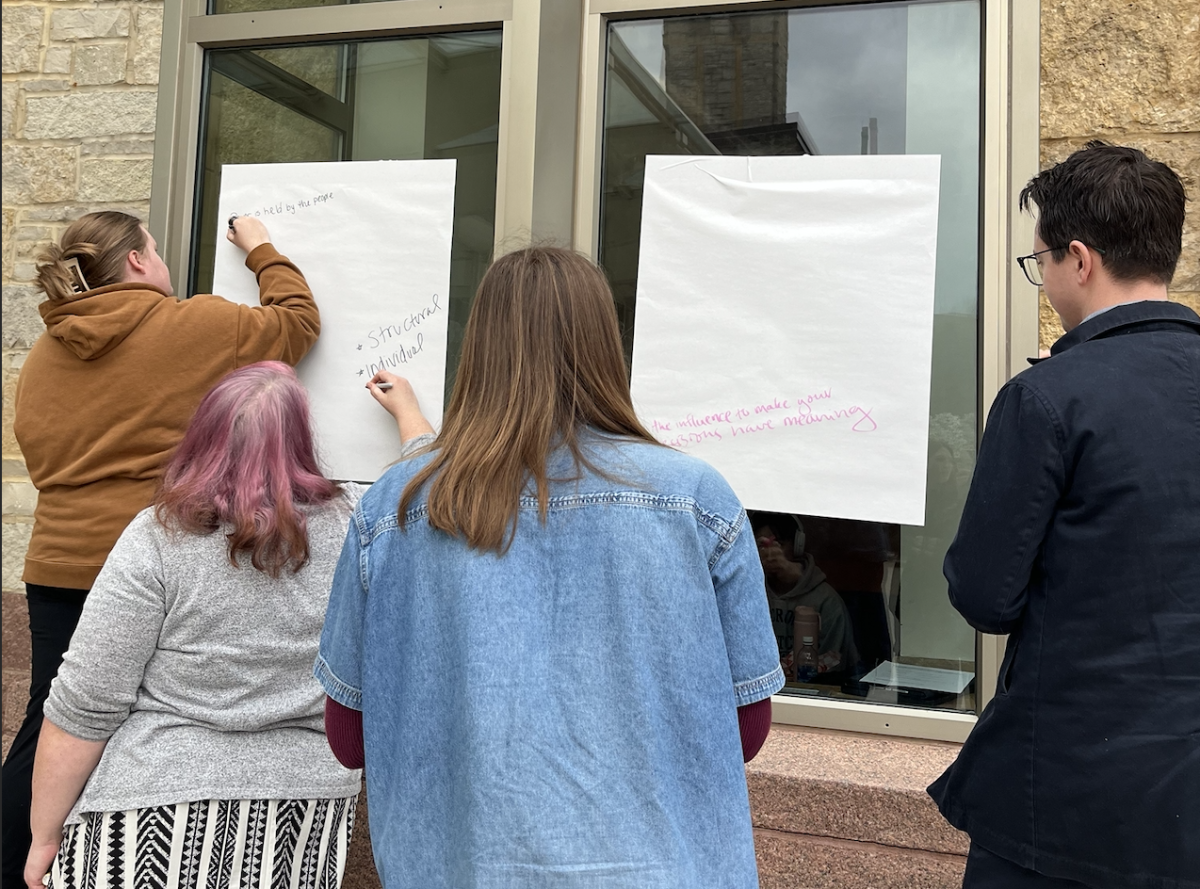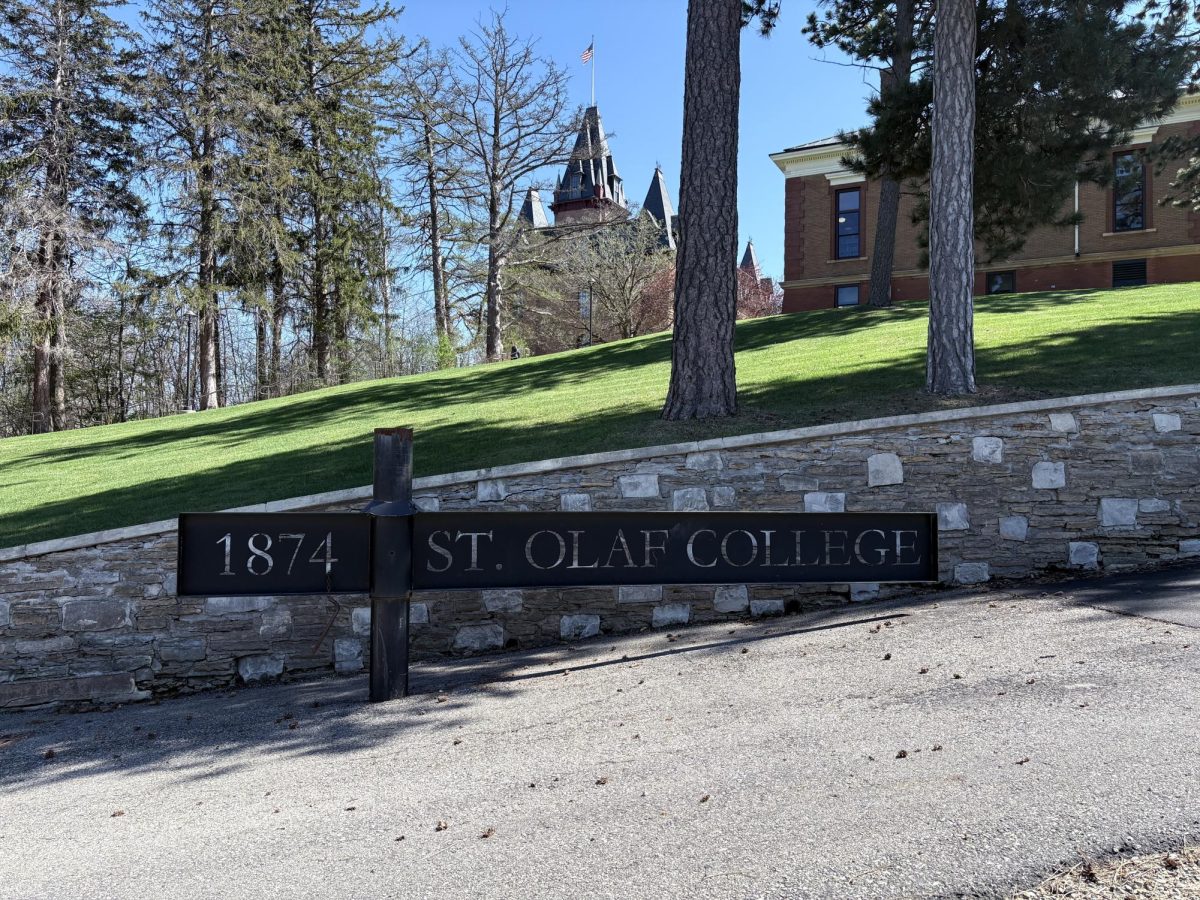Citing damage to students and campus alike, the Student Government Association SGA president and vice president planned to announce the cancellation of St. Olaf’s annual Lutefest celebration on Thursday, March 14.
The decision, executed by SGA President Catherine Haines ’13 and Vice President Matt Alveshere ’13, is the result of conversations that have been going on for months.
At the beginning of the 2011-2012 academic year, the previous President Jon Laven ’12 and Vice President Klara Wagnild ’12 started a senate committee to address the behavior and attitude that has become associated with Lutefest. By collaborating with various branches of senate, including the Music Entertainment Committee MEC, other senators and coordinators of student organizations, SGA hoped to make massive changes to Lutefest.
“We wanted to try to maintain a really fun event that would be safer than it had in the past,” Haines said. “It was going to be a last-ditch effort. If we put everything into this and it still didn’t work out, then we would really have to reassess.”
Last year, SGA decided to plan a night activity as part of Lutefest, a comedy performance by Judah Friedlander, to encourage students to do something safe and fun with their evening. SGA also added additional security in Stav Hall and around campus for the day, while student organizations and student government branches put in extra work and money. All in all, SGA spent nearly $35,000 on that day alone. According to Haines, even with the extra precautions, the campus saw just as many, if not more, hospitalizations.
“After [last year’s effort], we sparked a conversation to critically look at the issues,” Alveshere said.
This fall, Haines and Alveshere formed focus groups with residence life staff, hall councils and campus Public Safety to talk about issues and changes that could be made to Lutefest in the coming year.
After discussions with the focus groups, as well as additional conversations with Public Safety Director Fred Behr and administrators, Haines and Alveshere eventually came to their decision to cancel Lutefest.
“Of course, it was such a hard decision for both of us,” said Haines, who expressed disappointment in the failure of SGA’s efforts to minimize the damage of the event. “It comes down to the fact that it’s not a safe event, and you can’t just keep trying when it’s not safe.”
Alveshere agreed that the event was a hazard to the campus.
“The way we treat Buntrock Commons, Stav Hall, the employees of this campus, the vandalism of residence halls and in the quad – it’s this type of behavior that we couldn’t find an answer to address it and stop it,” Alveshere said.
Dean of Students Rosalyn Eaton-Neeb ’87, who has been a part the decision-making process, agreed that the vandalism is in no way justified.
“It’s difficult to put a price on food being thrown and trampled in Stav, or persons urinating on the Stav floor, or trays being left on tables for staff to pick up or having to bring in professional security staff to monitor student behavior,” Eaton-Neeb said.
In addition to vandalism issues, the event was not always a positive experience for the student body, according to Alveshere.
“Lutefest is an event that St. Olaf students leave campus because of,” Alveshere said. “So, we’re planning an event that students want to avoid. How can we, as a student government, run an event like that?”
St. Olaf is not the only campus that has been re-evaluating its spring events. Peer colleges are addressing similar safety concerns, and the issue of culture change on college campuses is not a new one.
“We actually did some research about college campus culture,” Alveshere said. He said that the research pointed to the same conclusion to which he and Haines had been arriving, that “unless there’s drastic change, you aren’t going to change the culture.”
The executive team also emphasized the inconvenience the event imposes, not only on students and staff, but also on the larger Northfield community. Each year the city’s resources, from hospital staff to the local police force, are taken up by St. Olaf students on Lutefest.
“One year, all of the Northfield emergency medical technicians were occupied with St. Olaf students, so when an emergency call was placed, they had to dispatch Faribault EMTs,” Alveshere said. “In addition, last year the Northfield Hospital proactively increased their staff for the day, without being warned by the St. Olaf campus.”
Haines and Alveshere expect students to be upset, but hope that they will listen to the reasons behind the decisions. “It’s important to communicate with our peers about why this decision was made,” Alveshere said.
Haines agreed, adding, “At least a good chunk will understand. They’ll be upset, but they’ll understand the reasons. There’s no opinion in how we made the decision. It’s just all facts.”
In an attempt to avoid making what would have been Lutefest a “dark day” on campus, SGA is discussing the possibility of alternative programming for that night. In addition, several branches of SGA will have more money for programming of their own to take place throughout the remainder of the semester.
The cancellation of Lutefest will likely be a disappointment for St. Olaf’s campus bands.
“Obviously, this decision to cancel Lutefest is going to make campus band people livid,” MEC Coordinator Ryan Peterson ’14 said. “This was the biggest show of the year. I think this decision is detrimental to campus bands and their morale. It will affect them poorly. It’s frustrating.” Peterson said that because the executive team made the announcement to him three months before Lutefest was scheduled to occur, “it’s a big stumbling block.”
Even so, MEC is planning to create a venue for campus bands to perform before the school year ends.
“We’re thinking about doing a last day of class campus band festival in order to get a similar outcome with a less destructive reputation,” he said.
Peterson is not the only one predicting a negative reaction from some students. Eaton-Neeb said that she anticipates some of the student body will be disappointed, while others will be relieved.
“It’s possible that some will respond poorly, but I hope that they are able to pause to consider why,” Eaton-Neeb said. “A group of smart, earnest people tried very hard to continue Lutefest and could not see a way to do so safely.”
The decision to cancel Lutefest after its nine-year run was, ultimately, the only possible solution, according to Haines. Hopeful for a safer campus and a happier community that Saturday in May, the executive team is looking forward to finding a different way to spend time, energy and $35,000.


